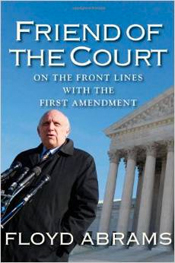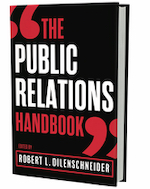The First Amendment's guarantee of free speech is simple, yet vague. Its very meaning has sparked controversies between individuals, government and organizations. The litigation of First Amendment cases evokes passion on both sides. The philosophical underpinnings of these cases set the course for our country and the exchange of ideas.
 Floyd Abrams, one of the most highly regarded First Amendment attorneys, gives many examples of these conflicts in his new book, Friend of the Court: On the Front Lines of the First Amendment (Yale University Press, 2014).
Floyd Abrams, one of the most highly regarded First Amendment attorneys, gives many examples of these conflicts in his new book, Friend of the Court: On the Front Lines of the First Amendment (Yale University Press, 2014).
This important, if somewhat weighty tome is a compendium of Abrams’s op-eds, speeches, oral argument transcripts, journal articles and book reviews. Through these well-researched and documented writings, the reader is treated to a mosaic of the First Amendment.
Abrams is most closely associated with the case of U.S. v. The New York Times (the Pentagon Papers) and served as co-counsel for the Times, arguing for the newspaper's right to publish the leaked study of the origins and conduct of the Vietnam War.
The U.S. District Court in New York initially issued an injunction prohibiting publication. Several weeks later, the Supreme Court overturned that decision and allowed for publication of the Pentagon Papers. Their publication, according to Abrams, “signaled the end of an era of press-government collaboration.” The decision was “a major victory for the press in its battle against censorship by any branch of the government.
When it comes to defending the First Amendment against government encroachment, Abrams is equally critical of Republican and Democratic officials. When New York City Mayor Rudolph Giuliani wanted to withhold funds from the Brooklyn Museum because it refused to cancel an exhibit he considered vulgar. Abrams is also highly critical of the Clinton Administration on matters of free speech. Bill Clinton signed the overly broad Communications Decency Act, which prohibited the posting of “indecent pictures on the Internet.” The administration also supported the Honor and Decency Act, which would have prohibited the sale of magazines such as Penthouse in military PXs.
By far, one of the most controversial First Amendment cases was Citizens United v. Federal Election Commission. Citizens United, a conservative group, which receives some of its funding from corporations, produced a documentary that was critical Hillary Clinton. The film was available by video on demand during the blackout periods that campaign finance laws prohibited political advertising by corporations and labor unions. The Supreme Court eventually struck down the law and allowed for greater speech by outside groups, to the chagrin of many on the Left. [Disclosure: Shirley & Banister Public Affairs, which employs this writer, has done work for Citizens United.]
Abrams filed a friend of the court brief on behalf of Senate Minority Leader Mitch McConnell (R-KY). Abrams devotes nearly fifty pages to the case. His best summary for the underpinnings of the case and the outrage it brought on is from the Law Journal:
“Yet for all the angst about the Citizens United ruling and all the denunciations of it, the ruling is based on the most firmly established and least controversial First Amendment principles. So for me, the truly disturbing visage is not that five members of the Court gave such weight to the First Amendment that some long-standing bans on corporate and union participation in the nation’s electoral process fell; it was that four members of the Court and many of its distinguished and powerful observers serenely acquiesced in the criminalization of a documentary urging Americans not to elect as President a leading candidate for that position.”
While Abrams has been a very successful attorney, he has had his share of losses. One such case arose in 1987. Abrams represented the publishing giant Random House, which planned to publish a biography of author J.D. Salinger. Salinger lived for years as a recluse in New Hampshire and did everything possible to stop the publication of a biography. The planned biography would have included letters written by Salinger, which had been donated by their recipients to various university libraries.
A lower court issued an injunction against Random House, saying that since the letters had been “unpublished” the court said they could not be quoted. The Supreme Court refused to hear the case, thus upholding the injunction. Abrams makes the point that these cases should be balanced against the public’s right to know and the fostering of scholarship.
Friend of the Court is an outstanding reference for understanding the controversies of the First Amendment through the eyes of one who has lived them. It is a long look at history as well as a glimpse of the future. Abrams is at his best when conveying principled stands on the First Amendment.
* * *
Kevin P. McVicker is account supervisor with Shirley & Banister Public Affairs in Alexandria, Va.


 Time correspondent Simon Shuster’s “The Showman” demonstrates how Ukraine president Volodymyr Zelensky’s masterful knowledge of PR tactics and the power of propaganda transformed him from comedian into a respected world leader.
Time correspondent Simon Shuster’s “The Showman” demonstrates how Ukraine president Volodymyr Zelensky’s masterful knowledge of PR tactics and the power of propaganda transformed him from comedian into a respected world leader. Iuliia Mendel, who served as press secretary for Ukraine president Volodymyr Zelensky from 2019 to 2021, will release a book called “The Fight Of Our Lives” in September, published by Simon & Schuster’s One Signal Publishers.
Iuliia Mendel, who served as press secretary for Ukraine president Volodymyr Zelensky from 2019 to 2021, will release a book called “The Fight Of Our Lives” in September, published by Simon & Schuster’s One Signal Publishers. Robert Dilenschneider, former CEO of Hill and Knowlton, is releasing the fifth edition of The Public Relations Handbook on Feb. 15.
Robert Dilenschneider, former CEO of Hill and Knowlton, is releasing the fifth edition of The Public Relations Handbook on Feb. 15.  Big Advertising may be down for the count, but the power of marketing lives on. That’s the big takeaway from Paul Dyer’s “Friction Fatigue,” a look at what advertising’s downward spiral means for “future-focused brands."
Big Advertising may be down for the count, but the power of marketing lives on. That’s the big takeaway from Paul Dyer’s “Friction Fatigue,” a look at what advertising’s downward spiral means for “future-focused brands." Sabrina Horn, the high-tech PR guru who sold her Horn Group to Finn Partners in 2015, has published “Make It, Don’t Fake It.”
Sabrina Horn, the high-tech PR guru who sold her Horn Group to Finn Partners in 2015, has published “Make It, Don’t Fake It.”


 Have a comment? Send it to
Have a comment? Send it to 
No comments have been submitted for this story yet.